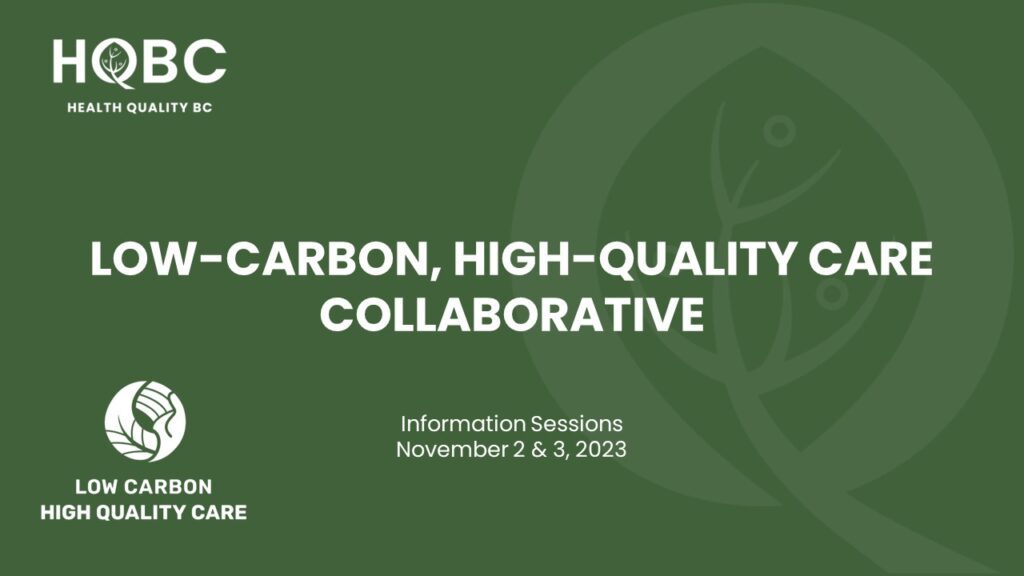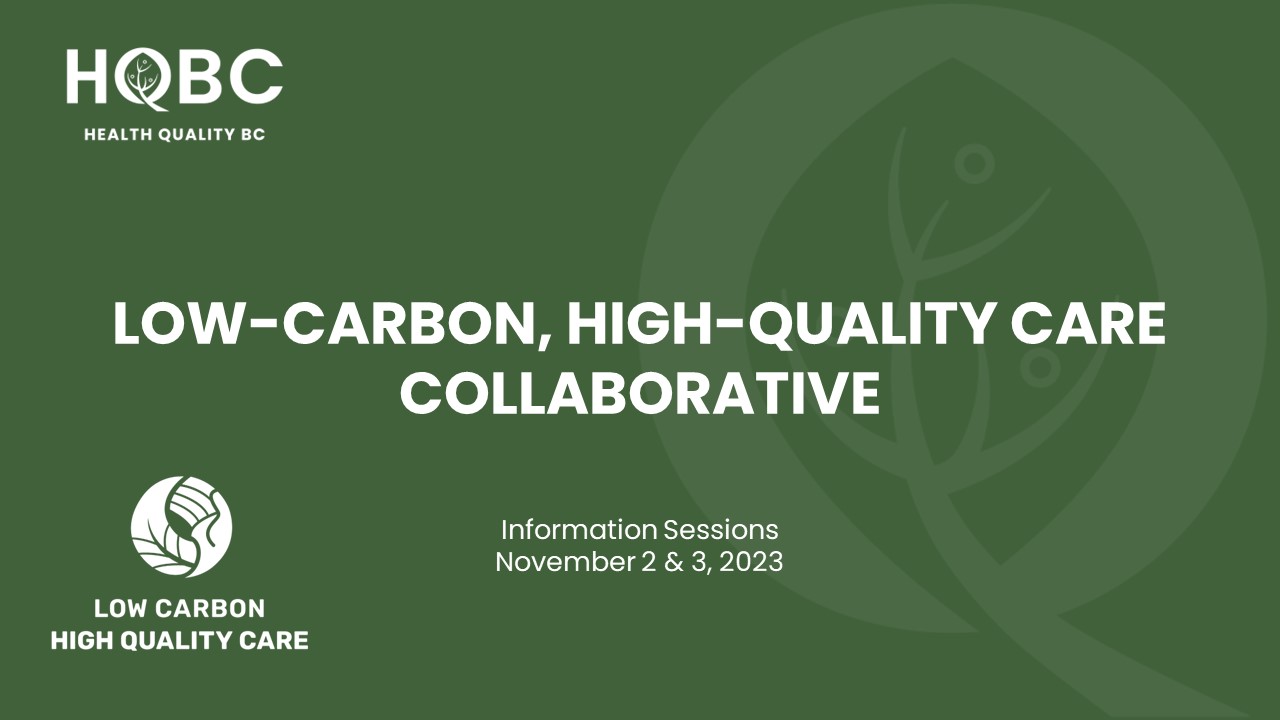
Low-Carbon, High-Quality Care Collaborative
Teams working together to improve health care quality while decreasing the environmental costs of how care is delivered.
Delivered in Partnership




The Low-Carbon, High-Quality Care Collaborative is a provincial quality improvement initiative with a goal to spread and scale up efforts and share knowledge of low-carbon practices that improve the quality of care.
By supporting and leading low-carbon, high-quality clinical care, health care professionals have an opportunity to feel connected by being a part of meaningful work that contributes to the health of patients and to the health of our planet.
While our call for applications is now closed, please contact us at lowcarbon@healthqualitybc.ca if you have questions or interest in participating in upcoming opportunities.
Did you know?

Health systems contribute upwards of 5% of greenhouse gas emissions, almost on par with the aviation industry’s environmental impact.*

1 aerosol inhaler, depending on the type, can have the same carbon footprint as driving up to 170km in a gas car.*

An operating surgical suite has an estimated impact of over 3,200,000kg CO2e. Equivalent to powering over 718 Canadian homes annually.*
What is the Low-Carbon, High-Quality Care Collaborative?
The Low-Carbon, High-Quality Care collaborative is a one-year collaborative aimed at accelerating efforts to reduce health care’s environmental footprint through clinical practice changes that look to improve the dimensions of quality.
Teams will move all of us working in the health system one step closer to improving health care quality while decreasing the environmental costs of how we deliver care. Teams will have access to clinical and quality improvement expertise, peer-to-peer learning and mentorship, and curated resources.
Two Impactful Streams
We’ve structured the collaborative into two streams so we can work together while affecting the most change in two areas where leading practices are already driving changes for individual health care professionals, programs, and services at the strategic and organizational levels.
Climate Conscious Inhaler Practices
GOAL: To implement low-carbon inhaler practices related to the management of asthma and COPD.
The Climate Conscious Inhaler Practices stream is best suited to:
Sustainable Perioperative Practices
GOAL: Apply sustainable approaches to improve patient experiences and perioperative efficiencies.
The Sustainable Perioperative Practices stream is best suited to:
What Does Participation Look Like For Teams
The collaborative is designed for teams of health care professionals working with asthma and COPD patients, and teams of health care professionals working in the perioperative setting.
Teams can include any combination of people who practice in their respective clinical settings and should have the authority to make decisions in their clinical setting or have the support of decision-makers.
All teams will benefit from having a project lead, and access to quality improvement leads and/or those with experience with data collection and measurement.
What is the time commitment?
Webinars will be recorded and made available to view for team members who are not able to attend. Coaching will be scheduled to work with the local team to allow as many team members to attend as possible. The learning and testing of change ideas can happen on a flexible schedule that works for your team.
Join us at One of Our Information Sessions
Making small changes in clinical care can have a big impact on mitigating our environmental impact, creating sustainability, and ensuring high-quality care for the province of BC.
The are no Low-Carbon, High-Quality Care Collaborative information sessions currently scheduled.
View slides from our previous information sessions.
Download Our Information Session Slides
Making small changes in clinical care can have a big impact on mitigating our environmental impact, creating sustainability, and ensuring high-quality care for the province of BC.
Still have questions?
Low-Carbon, High-Quality Care Collaborative
Questions and Answers
Whether you are looking to start your low-carbon, high-quality care journey from the beginning or expand your current clinical practices through a low-carbon lens, this collaborative will help teams accelerate their efforts.
Have more questions? Email us at lowcarbon@healthqualitybc.ca.
Become a Low-Carbon Champion
Each and every one of us has experienced the impact of climate change here in BC. From extreme weather events, devasting wildfire and damaging floods, these climate related impacts not only disrupt how we access health services but also contribute to increase health risks like heat-related illnesses, respiratory conditions and stress, anxiety and trauma.*
Health care professionals have an opportunity to play a key role in improving health care quality while decreasing the environmental costs of how we deliver care. This is meaningful work that can contribute to both the health of patients and the health of our planet.
Making small changes in clinical care can have a big impact on mitigating our environmental impact, creating sustainability, and ensuring high-quality care for the province of BC.
Sign up to be a Low-Carbon champion to receive resources, links to webinars and learning opportunities that focus on improving quality through a low-carbon lens.


